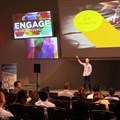#BizTrends2020: Creativity in a data lead world

The last few decades have seen a technological revolution that has dramatically changed the way in which we live and work and the digitisation of products and services is creating a swell of customer data. Data fuels our technologies, economies, populations, politics, education, healthcare, future work, and in reality, it fuels our overall survival.
Data is the new oil
Every 60 seconds 4,166,667 Facebook users like a post, 300 hours of new video is uploaded to YouTube, Apple users download 51,000 apps. And this will continue to grow at a rapid pace. In 2020 smartwatches will produce 28 PetaBytes per minute, that is 4 times what Facebook produced in 2019. With every swipe, every like, every snap, and every view that you create gives us data to better profile the users we target online.
The internet has produced a ton of juicy data for us, but this data is only valuable once it’s been refined and the more it is connected, the more it increases in value. Since the advent of the internet, our data is centralised in the servers of tech companies. That also has meant that the value and economic potential of that data has increased exponentially.
One way to imagine data is seeing it as an asset class – just like oil and other commodities. In 2017, The Economist wrote that data is the new oil. Customers have become aware of how valuable their data has become and have grown increasingly weary of their exposure over the internet. The stringent regulations introduced by acts like Protection of Personal Information (PoPIA) and the European version, General Data Protection Regulation (GDPR) provide a level of protection for customers and complexity for organisations. There is however still value in anonymised information.
Data should trigger innovation
We must shift how we view and treat data in order to better prepare for an increasingly data-saturated future. It’s there to provide insight and open up new opportunities. Making the most of those opportunities remains the work of the human imagination.
Creatives must find the courage to use that insight in imaginative ways. It should elevate creativity and open up new spaces and opportunities. Data should trigger innovation – used in the right way, data should inspire.
It also means looking at data that can influence the entire business value chain and not just marketing metrics that in isolation hold little meaning outside of the marketing department.
Evidence of the value of data-led creativity is all around us: from the way you experience films and TV on Netflix to your Spotify playlist. Both do an exceptional job providing subscribers with individualised recommendations based on user behaviour.
Relevance is key
In this user-demand time-starved world, relevance is key. Know your customer – their needs, their behaviour - create relevant content and provide easy access – then learn and evolve. Build your personalisation strategy by using deductive research, inductive research and customer self-selected methods – excellent tools from which to model customer segment behaviour profiles.
Although the marketing funnel fundamentals still apply, ultimately the consumer will decide where to click and what to purchase, and companies that can serve those consumers better will win the game.








































